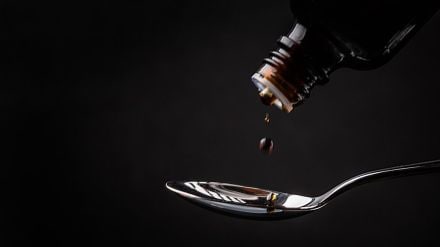The death toll from the consumption of ‘toxic’ cough syrup has increased to 19 in Madhya Pradesh, after two children aged 2 and 3 years passed away from the complications on Tuesday. Coldrif is at the centre of the controversy after 17 children from Madhya Pradesh and Rajasthan died of kidney failure complications after consuming the cough syrup.
The cough syrup reportedly had a toxin, diethylene glycol, nearly 500 times the permissible limit, as per a police complaint seen by Reuters. Cough syrup deaths in children commonly happen due to overdose, contamination, or misadventure. The side effects of such contamination include kidney failure, respiratory distress, or neurological problems, which can even be life-threatening.
Dr Pankaj Hari, head of paediatrics department, All-India Institute of Medical Sciences (AIIMS), Delhi, told the Indian Express that cough syrups don’t cause death unless contaminated and that syrups with Dextromethorphan Hydrobromide are a very common active ingredient in over-the-counter cough syrups, and is rarely harmful. “You don’t develop kidney failure because of it,” he said.
Cough syrups are not recommended for children below 5 years. There are two types of cough syrups – decongestants and cough suppressants. While the former works by reducing nasal congestion, the latter promises to help with dry cough.
Coughing isn’t always bad. In fact, it is our basic defense mechanism and helps expel air, mucus, and microbes, preventing us from bigger complications. However, when it becomes incessant, remedies are sought, and cough syrup enters the picture.
Do cough syrups really heal?
Cough syrups have been the go-to medication for treating coughs, particularly during flu and cold seasons, for decades. Recent studies, however, indicate that these over-the-counter medications might not give the relief anticipated by many.
Scientific research finds that the majority of the readily available-for-sale cough syrups don’t stop the cough, nor do they give the child a faster recovery. Studies suggest that such syrups offer no better performance. Most of the cough syrups’ ability is to inhibit the natural cough reflex of the body.
Studies say cough syrups don’t stop cough and performed no better than placebo. They only block the body’s cough reflex. In fact, a study published in BMJ says the effect of cough medicines is mainly placebo.
“Cough syrups suppress the cough for a short time but fail to cure the infection or irritation causing the cough. Additionally, the apparent efficacy of cough syrups is largely due to the placebo effect, wherein the sweet flavor and smooth texture of the syrup soothe the throat and stimulate saliva production, creating a sense of relief for the consumer. This placebo effect can be very strong but is quite different from true medical effectiveness,” says Dr Vivek Jain, Senior Director & Unit Head, Paediatrics, Fortis Hospital, Shalimar Bagh.
“Most of the cough syrups’ ability is to inhibit the natural cough reflex of the body. A momentary relief may be felt, but the reason of the cough, which can be an infection, allergy, or irritation of the throat, is not healed yet. The cough reflex is the mechanism by which the body gets rid of the mucus, dust, or germs that enter the airway, and if it is turned off without necessity, the procedure that is causing even more damage in some cases is inefficient at a minimum level and wrong at the other,” says Dr. Parimala V Thirumalesh, Sr. Consultant – Neonatology & Paediatrics, Aster CMI Hospital, Bengaluru.
What happens when kids below 5 years consume cough syrup
Over-the-counter cough and cold medicine is not recommended for babies and young children as the risks of using these medicines is more than any help the medicines might have in reducing cold symptoms.
“In kids, especially in those less than six years old, the use of cough syrups might be dangerous. Some of the side effects they might have are drowsiness, nausea, vomiting, or respiratory trouble in the case of overdose. For this reason, all major health organizations and paediatricians strongly advise that no cough medicine should be given to infants,” says Dr Parimala.
“Due to lack of benefit and risk of the associated side effects, medical professionals are increasingly recommending non-pharmacological management of cough in children. This is one of many growing responses to a general concert of evidence-based approaches, and generally to safer approaches of managing common symptoms,” says Dr. Arvind K Minz, Clinical Director- Internal Medicine, Marengo Asia Hospitals Faridabad.
Home remedies for cough relief
Instead of cough syrup, doctors advise simple home remedies can help soothe the cough. From warm fluids to steam inhalation, the age-old remedies could hydrate and soothe.
“In place of medication, the simple remedies of the home can have a better effect of the illness as they are the hydration of the child, administering warm fluids like soup or honey with warm water (for children over one year), and steam inhalation to soothe the throat,” says the expert.
